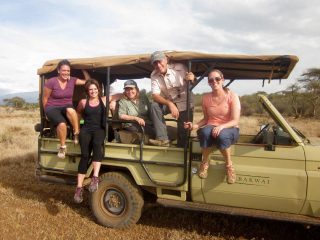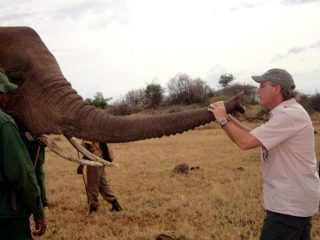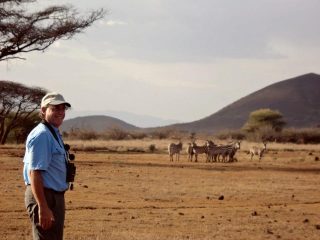
You might expect to find Professional Services Council‘s (PSC) president and CEO Stan Soloway in DC and around the beltway advocating for acquisition reform, but you will also find him hanging out with an elephant named Incarsis in Tanzania.
Soloway and his family have established The Ndarakwai Experience, a nonprofit organization that involves his entire family and will bring students from Anacostia’s Thurgood Marshall Academy to the Ranch for a unique international service learning experience.
WashingtonExec: Why you started this organization?
Stan Soloway: We — my wife, Kathy, three daughters and I — created The Ndarakwai Experience Foundation after we had the chance to spend some time at Ndarakwai Ranch in 2013. The ranch is a private conservancy of some 11,000 acres with a wonderful array of constantly migrating wildlife. It, and its owner, is also a leader in local anti-poaching and conservation efforts and has a tremendous ethic of community service. In fact, they provide all of the meals and do infrastructure building and repairs at the local primary and secondary schools.
While visiting the ranch, my family and I began ruminating on what a great opportunity it could present for a unique international service learning experience. We know without question that such experiences can be life-changing and the idea of being a part of such an experience excited us all. In fact, it was a natural conversation given that my wife spent 30 years as a social worker in D.C.; my oldest daughter, Mollie, was a mentor for at-risk youth for more than a half dozen years after college; my middle daughter, Anna, who is the [Ndarakwai Experience] program director, has been a social worker for at-risk urban youth for almost nine years, and lived and worked in Africa; and my youngest, Sonya, is a teacher who now runs the Jumpstart Program at Howard University. And I personally have been heavily involved in national service efforts, including AmeriCorps.
“Our goal is to bring the experience to those from more difficult circumstances who are demonstrating the kinds of ability and commitment to achievement that we should all want to support and enhance. For them, the impacts could well be even greater than for the average participant.”
Meanwhile, given the ranch’s culture and local role, it didn’t take more than a few minutes to get Peter Jones, the owner, excited about the idea, as well. Given the ranch’s existing community service ethic and his desire to expand their “voluntourism” activities, that too, came naturally.
After several months of talking about it, Anna finally said, “So, are we going to do this or not?” Obviously the answer was “yes.”
We incorporated earlier this year; established our partnership with the ranch and with the Thurgood Marshall Academy, a high-performing, law-based charter school in Anacostia, D.C., from which the students will come; and got down to the task of building a real program — including raising the requisite funds.

We were looking for students who we believe would be best suited to gaining the most from the experience. Frankly, not every 15- or 16-year-old is at a point where they are ready for something like this and able to really get the most benefit. So, we were looking for students who demonstrated, in their interviews and their applications, a degree of curiosity about the world and their place in it, a desire to explore beyond their comfort zones, the kind of maturity which would enable them to experience and accept and welcome the experiences associated with a wholly different and sometimes challenging culture or environment.
We also, for obvious reasons, require good academic standing but we aren’t limiting ourselves to just the top students. There are plenty of kids in that age group who may not be great students, but for whom an experience like this can be a catalyst and extraordinary opportunity for growth.
We accepted six students into the program for this year and hope to expand it next year.
Our first trip is scheduled for the last two weeks of June 2015. Immediately following [Jan. 1], we will begin a series of orientations, language, cultural and historical discussions, and other workshops in preparation for the trip.
It was a real family effort to get it off the ground. In addition to my daughter who is a crisis counselor in a D.C. charter school, another daughter, helped us think through participant qualifications and built our website; and our third daughter has provided invaluable counsel based on her nearly eight years as a counselor in a youth mentorship program which also involved international travel. And we now have the rest of our team together, including two extraordinary staff members from Thurgood Marshall Academy and another individual who has spent years doing outdoor education programs with youth. It’s a great group to be around!
WashingtonExec: What will the students do?
Stan Soloway: Conservation work at the ranch will include searching for snares, repairing watering holes, invasive species removal, species counting, etc.; at the schools, the students will paint, repair, recess with the students and have cultural exchanges/sharing; and during off hours, there will be game drives, game walks, visits to local maasai boma (villages) and bead-making lessons.
Additionally, because Thurgood Marshall is a law-based school, we are also planning visits to the East African Court of Human Rights in Arusha, as well as to the tribunal where the war crime trials associated with the Rwandan genocide have been held.
They will also have sessions with development experts in the area that focus on food, environment, governance and more.

WashingtonExec: Why did you choose Tanzania?
Stan Soloway: It wasn’t so much Tanzania as it was Ndarakwai Ranch itself that was the driver. It is a beautiful place on the western edge of Mt. Kilimanjaro and has since its founding more than a decade ago, been a leader in the conservation and anti-poaching movement. That, plus the ranch’s existing and very real engagement with the local villages and schools, made it a perfect partner.
WashingtonExec: How is the program funded?
Stan Soloway: We are entirely funded by private and some corporate contributions in the $5,000-$10,000 range, and by a modest amount that we have been able to put in on our own. We are fortunate to have been able to build an all-volunteer team of experienced professionals and can thus do the program for a very modest budget.
For the first year, we are about 75 to 80 percent of the way to our funding needs. Needless to say, we would welcome ANY support that individuals or companies might want to offer! Our plan is to build the program into an annual one and potentially even expand it. And eventually, sustaining it will require building support among interested foundations and philanthropic organizations. But, for now, for the first couple of years, we must rely on friends, colleagues and others who understand and support what we are trying to accomplish.
WashingtonExec: What kind of impact will this program have on the participants?
Stan Soloway: That’s both the most important question and, fortunately, an easy one to answer.
There is ample, well-documented evidence of the positive impacts community service has on the participant. Studies have clearly shown that those who do community service, especially on a somewhat regular basis, tend to be more self-aware and build a much firmer, life-long commitment to civic engagement. As we all know, building civic engagement is a vital part of building a strong community and society. And when you add to that the equally well-documented evidence that international learning has important, long-term impacts on the participant’s self-confidence, maturation and sense of self, you have the recipe for a very powerful experience.
Unfortunately, we also know that these kinds of experiences, while available, tend to be accessible principally to more privileged young people. Hence, our goal is to bring the experience to those from more difficult circumstances who are demonstrating the kinds of ability and commitment to achievement that we should all want to support and enhance. For them, the impacts could well be even greater than for the average participant. And given the quality and spirit of our inaugural group of participants, you can see why.
WashingtonExec: Are you accepting applications for staff to work this upcoming summer?
Stan Soloway: No. Right now we are limiting the actually program staffing to a few experienced volunteers. But, if we are eventually successful in expanding the program, who knows?
WashingtonExec: Anything else?
Stan Soloway: Well, let’s be frank. We’re still looking for that last portion of funding for this year. And, of course, to building a base of ongoing support. As such, I am always happy to talk to anyone who is interested in supporting the program. Learn more here.
Related: TMA Sophomores and Juniors Prepare for a Trip to Remember



1 Comment
Pingback: 2015 Market Outlook: Stan Soloway, Professional Services Council — Federal Budget, Cybersecurity Will Be Main Focus | WashingtonExec